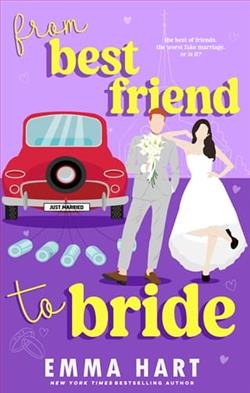Page 101 of Ophelia's Vampire
I spend more time watching Ophelia than I do minding the art or the other guests around us. I watch her keen eyes take it all in and return her small, bemused smile as we take our places near the back of the room.
Just a few seconds later, an elegant woman in a cream-colored sheath dress steps up to a podium near the front of the crowd. Behind her, a cloth-draped frame hangs on the wall.
“Thank you for joining us here tonight,” she begins. “As you know, in 1990, our museum was the target of a theft which saw thirteen irreplaceable works stolen.”
She talks a little more about the heist, the investigation, and when she pauses to gesture at the sheet-draped frame behind her, the anticipatory silence is so absolute that one might be able to hear a pin drop on the floor beneath us.
“Tonight, we have gathered those who have shown their unerring support to our museum to be the first to know one of those works has finally been returned.”
Two other staff members remove the cloth. A stunned hush falls over the crowd for a few suspended heartbeats before gasps and exclamations and excited conversation rise in a wave around the room.
Christ in the Storm on the Sea of Galileeis a wonder to behold.
A masterwork by Rembrandt, the surreality of seeing it returned to the spot it was stolen from over thirty years ago isn’t lost on a single soul in attendance.
Across the gallery, I catch Serra’s eye where I’ve just spotted her in the crowd. She grins like the cat who’s caught the canary as she inclines her head in silent congratulations.
“Additionally,” the curator goes on, though her voice is nearly lost in the fray, “a very special thanks goes out to our anonymous donor, who not only recovered this priceless work of art, but returned it freely to the museum.”
The curator’s eyes meet mine for a fraction of a second before gliding quickly away, and she goes back to addressing the crowd.
Ophelia, however, misses nothing.
She stiffens beside me, gaze bouncing from me to the curator and then back again in quick succession before she schools her features into neutrality for the rest of the speech.
When the curator steps away from the podium and the crowd surges back to life—conversation rising, guests stepping forward to marvel at the masterpiece finally come home—Ophelia leans in close.
“It was you?” she whispers.
I lay a hand over my heart in a gesture of insincere humility. “Of course not. It was an anonymous donor. A very kind, very generous, very handsome anonymous donor who—”
Ophelia turns on her heel and walks quickly out of the room, through an arched doorway and away from the throng of guests.
I’m frozen where I stand, staring after her and wondering what exactly I’ve done to ruin the evening’s mood so spectacularly. By the time I shake myself free of that paralysis and go after her, I catch sight of her climbing a set of stairs just outside the gallery leading up to the third floor. I follow, trailing after the flash of her black gown as she steps into another of the galleries.
Ophelia stands at one of the wide windows overlooking the courtyard, aglow in the lights shining up from below. She tenses as I approach, watching me with wide eyes.
“How?” is all she says.
I give her a brief, murmured rundown of the months I spent tracking the painting, looking periodically over my shoulder to ensure we’re not overheard.
There’s no real reason I should need to remain anonymous, other than… I don’t want the attention. Not for this. Not for anything, really, but using my skills and the networks I’ve built over my centuries for this bit of good?
I don’t need any recognition for that.
When I’m finished, a heavy silence falls between us. A dozen different emotions flicker across her face as she processes, but the one that shines clear as day when she speaks again sends a hairline crack straight down the center of my chest.
“You’re incredible. All of this is incredible.” Ophelia looks at me with something like awe in her eyes, and my gut twist uncomfortably.
“Hardly,” I say, tone a little more curt than I intended. “I saw the chance to return the piece to it’s rightful home, so I took that chance. Anyone else would have—”
“You’re a good man, Casimir.”
Ophelia’s soft, certain words may as well be an unsheathed dagger for all the carnage they wreak. Straight through my skin, my sinew, my bones, sinking into the cold dead thing I might have once called a heart.
“You are,” she says, more adamant this time as her eyes rove across my face and take in the ruin she’s made of me. “I don’t really care if you don’t believe me. And I don’t mind reminding you until you do.”
She takes my hand in hers, lifts it to her lips, and presses a kiss to the backs of my fingers, just as I did to hers earlier this evening. That awe doesn’t leave her eyes, and her smile is soft and gentle and more beautiful than anything I’ve ever seen.















